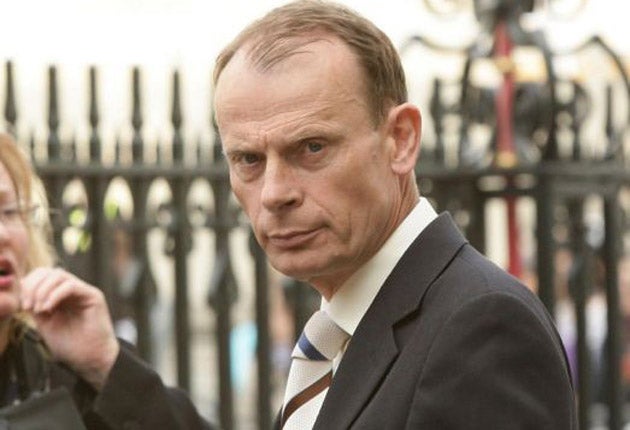Your support helps us to tell the story
This election is still a dead heat, according to most polls. In a fight with such wafer-thin margins, we need reporters on the ground talking to the people Trump and Harris are courting. Your support allows us to keep sending journalists to the story.
The Independent is trusted by 27 million Americans from across the entire political spectrum every month. Unlike many other quality news outlets, we choose not to lock you out of our reporting and analysis with paywalls. But quality journalism must still be paid for.
Help us keep bring these critical stories to light. Your support makes all the difference.
Private Eye editor Ian Hislop has accused the BBC's Andrew Marr of hypocrisy after he admitted taking out a controversial super-injunction while working as a journalist.
Mr Marr, the corporation's former political editor, won a High Court order in January 2008 to silence the press following his extra-marital affair with another national newspaper reporter.
Mr Hislop, who has been fighting the so-called gagging order and challenged the injunction only last week, condemned the suppression of reporting as "a touch hypocritical" today.
"As a leading BBC interviewer who is asking politicians about failures in judgment, failures in their private lives, inconsistencies, it was pretty rank of him to have an injunction while working as an active journalist," he said.
"I think he knows that and I'm very pleased he's come forward and said 'I can no longer do this'."
Mr Marr, he said, had written an article saying that Parliament - not judges - should determine privacy law.
The injunction is one of a series of court orders granted by judges in recent years as individuals resort to the law to protect their privacy.
In an interview with the Daily Mail, Mr Marr - married to Guardian columnist Jackie Ashley with three children - said he now felt "uneasy" about the order taken out to protect his family's privacy.
"I did not come into journalism to go around gagging journalists," he told the newspaper.
"Am I embarrassed by it? Yes. Am I uneasy about it? Yes."
But he added: "I also had my own family to think about, and I believed this story was nobody else's business.
"I still believe there was, under those circumstances, no public interest in it."
But he said the use of injunctions now seemed to be "running out of control".
"There is a case for privacy in a limited number of difficult situations, but then you have to move on. They shouldn't be forever and a proper sense of proportion is required," he said.
Under the terms of the injunction, the media has been banned from publishing any details relating to the indiscretion.
Mr Hislop, who stressed that Private Eye does not have the money to challenge all super-injunctions, told BBC Radio 4's Today programme: "In a sense, he led the pack because he was the most respectable of the people putting super-injunctions in.
"But the principle remains wrong, which he knows, articulated once and should still believe."
He added: "Here was a case that was quite important and should be challenged so I wasted the money challenging it."
His comments come amid growing disquiet at the use of injunctions and so-called super-injunctions by celebrities to prevent reporting of their private lives.
Last week Prime Minister David Cameron sounded a warning about the way judges are creating a new law of privacy "rather than Parliament".
"The judges are creating a sort of privacy law whereas what ought to happen in a parliamentary democracy is Parliament, which you elect and put there, should decide how much protection do we want for individuals and how much freedom of the press and the rest of it," he said.
"So I am a little uneasy about what is happening."
The Prime Minister's remarks came after High Court judge Mr Justice Eady issued what was thought to be the first order permanently blocking publication of material relating to an individual's private life.
In another High Court hearing, a married Premier League footballer who reportedly had an affair with Big Brother's Imogen Thomas won the right to maintain his anonymity.
Asked whether the Prime Minister would support reform of super-injunctions, a Downing Street spokeswoman said that the Government was awaiting the outcome of a review being carried out by Master of the Rolls Lord Neuberger.
The review, launched in April 2010, is expected to conclude "fairly soon", said the spokeswoman.
Index on Censorship, campaigners for press freedom, welcomed Mr Marr's decision to abandon the super-injunction.
Chief executive John Kampfner said: "While there may be exceptional circumstances in which injunctions may be necessary, we now are seeing gagging orders being used to hide the wealthy from embarrassment and even commercial damage.
"We are in danger of creating a secret network of secret rich man's justice."
Subscribe to Independent Premium to bookmark this article
Want to bookmark your favourite articles and stories to read or reference later? Start your Independent Premium subscription today.

Join our commenting forum
Join thought-provoking conversations, follow other Independent readers and see their replies
Comments